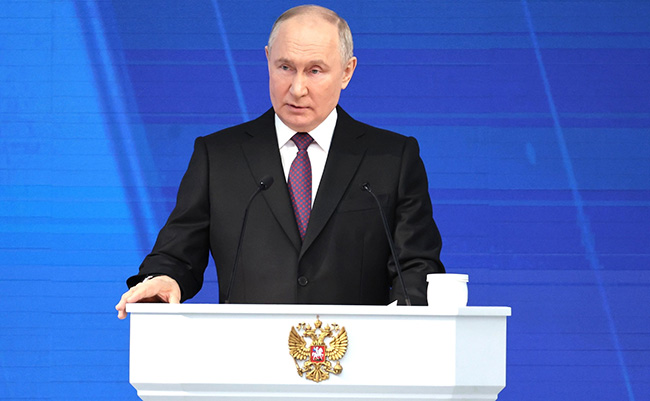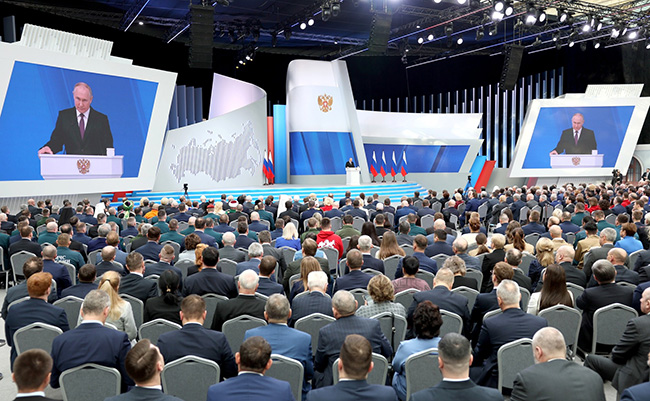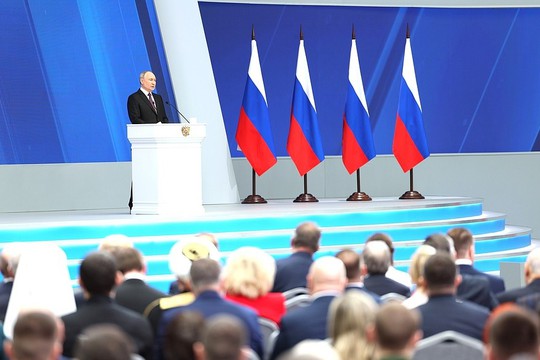Photo: Kremlin.ru
President of Russia Vladimir Putin delivered his Address to the Federal Assembly. The ceremony took place in Gostiny Dvor, Moscow. February 29, 2024. Main points on international problems:
- The so-called West, with its colonial practices and penchant for inciting ethnic conflicts around the world, not only seeks to impede our progress but also envisions a Russia that is a dependent, declining, and dying space where they can do as they please. In fact, they want to replicate in Russia what they have done in numerous other countries, including Ukraine: sowing discord in our home and weakening us from within. But they were wrong, which has become abundantly clear now that they ran up against the firm resolve and determination of our multi-ethnic people.
- Our soldiers and officers – Christians and Muslims, Buddhists and followers of Judaism, people representing different ethnicities, cultures, and regions – proved with their actions which are stronger than a thousand words that the centuries-old cohesion and unity of the people of Russia are a formidable and invincible force. All of them, shoulder to shoulder, are fighting for our shared Motherland.
- Together, as citizens of Russia, we will stand united in defence of our freedom and our right to a peaceful and dignified existence. We will chart our own course, to safeguard the continuity of generations, and thus the continuity of historical development, and address the challenges facing the country based on our outlook on the world, our traditions and beliefs, which we will pass down to our children.
- The defence and the strengthening of sovereignty are going on across the board, primarily, on the frontlines, where our troops are fighting with steadfast and selfless resolve.
 Photo: Kremlin.ru
Photo: Kremlin.ru
- Our Armed Forces have acquired a lot of experience, including in terms of coordinating all the wings of the military, as well as mastering the latest tactics and methods of war. This effort has given us so many talented and seasoned commanders who treasure their men and are diligent in performing their missions, know how to use new equipment and are effective when fulfilling their assignments. I would like to emphasise that this is happening at all levels, from platoons and operations units to the highest command.
- The Armed Forces have expanded their combat capabilities many-fold. Our units have seized the initiative and will not surrender it. They are confidently advancing in several operational theatres and liberating more territories.
- We were not the ones who started the war in Donbass, but, as I have already said many times, we will do everything to put an end to it, eradicate Nazism and fulfil all the objectives of the special military operation, as well as defend sovereignty and ensure that our people are safe.
- The strategic nuclear forces are on full combat alert and the ability to use them is assured. We have either already accomplished or are about to accomplish all our plans in terms of weapons in keeping with what I said in my 2018 Address.
- Kinzhal, the hypersonic air-launched complex, has not only entered combat duty, but has been effective when carrying out strikes against critical targets during the special military operation. By the same token, Zircon, a ship-based hypersonic missile complex, has already served in combat. It was not even mentioned during the 2018 address, but this missile system has also entered combat duty.
- Avangard hypersonic ICBMs, as well as the Peresvet laser complexes have also entered combat duty. Burevestnik, a cruise missile with an unlimited range, is about to complete its testing stage and so is the Poseidon, an unmanned underwater vehicle. These systems have proven that they meet the highest standards and it would not be an exaggeration to say that they offer unique capabilities. Our troops also received the first serially produced Sarmat heavy ballistic missiles. Soon, we will show them to you on their combat alert duty in the areas of their deployment.
- Russia is ready for dialogue with the United States on issues of strategic stability. However, it is important to clarify that in this case we are dealing with a state whose ruling circles are taking openly hostile actions towards us. So, they seriously intend to discuss strategic security issues with us while simultaneously trying to inflict strategic defeat on Russia on the battlefield, as they themselves say.
- Here is a good example of their hypocrisy. They have recently made unfounded allegations, in particular, against Russia, regarding plans to deploy nuclear weapons in space. Such fake narratives, and this story is unequivocally false, are designed to involve us in negotiations on their conditions, which will only benefit the United States.
- At the same time, they have blocked our proposal which has been on the table for over 15 years. I am referring to the agreement on preventing the deployment of weapons in outer space, which we drafted back in 2008. There has been zero reaction to it. It is totally unclear what they are talking about.
- Therefore, there are reasons to suspect that the current US administration’s professed interest in discussing strategic stability with us is merely demagoguery. They simply want to show to their citizens and the world, especially in the lead-up to the presidential election that they continue to rule the world, that they would talk with the Russians when it will benefit them and that there is nothing to talk about and they will try to inflict defeat on us otherwise. Business as usual, as they say.
- But this is unacceptable, of course. Our position is clear: if you want to discuss security and stability issues that are critical for the entire planet, this must be done as a package including, of course, all aspects that have to do with our national interests and have a direct bearing on the security of our country, the security of Russia.
- We are also aware of the Western attempts to draw us into an arms race, thereby exhausting us, mirroring the strategy they successfully employed with the Soviet Union in the 1980s. Let me remind you that in 1981–1988, the Soviet Union’s military spending amounted to 13 percent of GDP.
- Our current imperative is to bolster our defence industry in such a way as to increase our country’s scientific, technological and industrial capabilities. We must allocate resources as judiciously as possible, fostering an efficient economy for the Armed Forces, and maximising the return on each ruble of our defence spending. It is crucial for us to expedite the resolution of social, demographic, infrastructural and other problems we face while simultaneously advancing the quality of equipment for the Russian Army and Navy.
- We need to shore up the forces in the western strategic theatre in order to counteract the threats posed by NATO’s further eastward expansion, with Sweden and Finland joining the alliance.
- The West has provoked conflicts in Ukraine, the Middle East, and other regions around the world while consistently propagating falsehoods. Now they have the audacity to say that Russia harbours intentions of attacking Europe. Can you believe it? We all know that their claims are utterly baseless. And at the same time, they are selecting targets to strike on our territory and contemplating the most efficient means of destruction. Now they have started talking about the possibility of deploying NATO military contingents to Ukraine.
- But we remember what happened to those who sent their contingents to the territory of our country once before. Today, any potential aggressors will face far graver consequences. They must grasp that we also have weapons – yes, they know this, as I have just said – capable of striking targets on their territory.
- Everything they are inventing now, spooking the world with the threat of a conflict involving nuclear weapons, which potentially means the end of civilisation – don’t they realise this? The problem is that these are people who have never faced profound adversity; they have no conception of the horrors of war. We – even the younger generation of Russians – have endured such trials during the fight against international terrorism in the Caucasus, and now, in the conflict in Ukraine. But they continue to think of this as a kind of action cartoon.
- Indeed, just like any other ideology promoting racism, national superiority or exceptionalism, Russophobia is blinding and stupefying. The United States and its satellites have, in fact, dismantled the European security system which has created risks for everyone.
 Photo: Kremlin.ru
Photo: Kremlin.ru
- Clearly, a new equal and indivisible security framework must be created in Eurasia in the foreseeable future. We are ready for a substantive discussion on this subject with all countries and associations that may be interested in it. At the same time, I would like to reiterate (I think this is important for everyone) that no enduring international order is possible without a strong and sovereign Russia.
- We strive to unite the global majority’s efforts to respond to international challenges, such as turbulent transformation of the world economy, trade, finance, and technology markets, when former monopolies and stereotypes associated with them are collapsing.
- For example, in 2028, the BRICS countries, with account taken of the new members, will create about 37 percent of global GDP, while the G7 numbers will fall below 28 percent. These figures are quite telling because the situation was completely different just 10 or 15 years ago. You have heard me say it publicly before. These are the trends, you see. These are the global trends, and there is no escaping them since they are objective reality.
- Look, the G7 countries’ share in global GDP in terms of PPP stood at 45.7 percent in 1992, while the BRICS countries (this association did not exist in 1992) accounted for only 16.5 percent. In 2022, though, the G7 accounted for 30.3 percent, while BRICS had 31.5 percent. By 2028, the percentage will shift even more in favour of BRICS, with 36.6 percent, and the projected figure for the G7 is 27.8 percent. There is no getting away from this objective reality, and it will remain that way no matter what happens next, including even in Ukraine.
- We will continue to work with friendly countries to create effective and safe logistics corridors, relying on cutting-edge solutions for building a new global financial architecture that would be free from any political interference. This is especially important considering that the West has been undermining its own currencies and banking system by literally sawing off the branch it is sitting on.
- The principles of equality and respect for each other’s interests guide us in our interactions with our partners. This is why more and more countries have been proactive in seeking to be part of the activities of the EAEU, the SCO, BRICS and other associations involving Russia. We see a lot of promise in the project to build a Greater Eurasian Partnership and aligning integration processes within the Eurasian Economic Union and China’s Belt and Road Initiative.
- There has been positive momentum in Russia’s dialogue with ASEAN. The Russia-Africa summits have been a real breakthrough, with the African continent becoming increasingly assertive in pursuing its interests and enjoying genuine sovereignty. We sincerely support these aspirations.
- Russia has long-standing and positive relations with Arab states, which have their own unique and vibrant civilisation spanning across North Africa and the Middle East. It is our belief that we must find new points of convergence with our Arab friends and deepen our partnerships across the board. The same vision will guide our relations with Latin America.
read more in our Telegram-channel https://t.me/The_International_Affairs

 17:46 29.02.2024 •
17:46 29.02.2024 •























